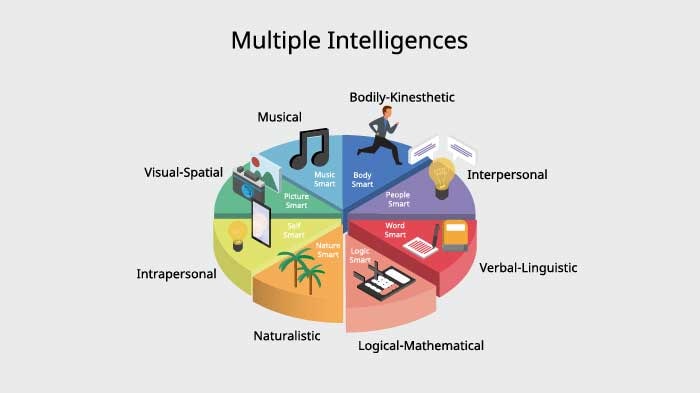It refers to the ability to understand and manage one's own emotions, motivations, strengths, and weaknesses. It involves self-awareness, introspection, and the ability to regulate emotions effectively. This article explores the significance of self-awareness, its components, benefits, and strategies for enhancing this essential skill.
Self-Awareness
Self-awareness is the cornerstone of intrapersonal intelligence. It involves recognizing and understanding one's emotions, beliefs, values, and behaviors. Individuals with high self-awareness have clarity about their strengths and weaknesses, which enables them to make informed decisions and set realistic goals.
Emotional Regulation
Emotional regulation refers to the ability to manage and control one's emotions in various situations. It involves recognizing triggers, practicing mindfulness, and employing strategies such as deep breathing or reframing negative thoughts. Effective emotional regulation promotes resilience, reduces stress, and enhances overall well-being.
Self-Reflection
Self-reflection is a critical aspect of intrapersonal intelligence that involves introspection and evaluation of one's thoughts, actions, and experiences. It allows individuals to learn from past experiences, identify patterns of behavior, and make adjustments to improve personal growth and development.
Goal Setting and Motivation
Self-understanding includes the ability to set meaningful goals and stay motivated to achieve them. Individuals with strong intrapersonal skills understand their own aspirations, values, and priorities, which helps them maintain focus and perseverance in pursuit of their objectives.
Enhanced Self-Awareness
Developing self-awareness enhances self-awareness, enabling individuals to recognize their emotions and reactions more accurately. This heightened awareness fosters better self-management and interpersonal relationships.
Improved Decision-Making
By understanding their values, motivations, and goals, individuals with strong self-awareness make more informed and aligned decisions. They can evaluate options based on personal priorities and long-term aspirations, leading to more fulfilling outcomes.
Set SMART Goals
Use the SMART (Specific, Measurable, Achievable, Relevant, Time-bound) criteria to set clear and attainable goals. Break down larger goals into smaller milestones to maintain motivation and track progress effectively.
Enhanced Communication
Individuals with developed self-understanding often exhibit better communication skills. They can express their thoughts and feelings clearly, assertively, and empathetically. This ability to communicate effectively fosters healthy relationships and reduces misunderstandings in personal and professional interactions.
Conflict Resolution
Strong intrapersonal intelligence facilitates effective conflict resolution. By understanding their own emotions and motivations, individuals can approach conflicts with empathy and objectivity. They are better equipped to listen actively, negotiate solutions, and find common ground, promoting constructive outcomes in challenging situations.
Leadership and Decision-Making
Leaders who possess self-understanding inspire trust and confidence among their team members. They demonstrate authenticity, emotional resilience, and a clear sense of purpose, which are essential qualities for effective leadership. Self-understanding also enhances decision-making abilities by enabling leaders to consider personal values, ethical principles, and long-term consequences when making impactful choices.
Personal Fulfillment
Developing self-awareness contributes to personal fulfillment and well-being. It enables individuals to align their actions with their core values, pursue meaningful goals, and cultivate a sense of purpose and satisfaction in life. By understanding themselves deeply, individuals can make choices that lead to greater happiness, fulfillment, and overall life satisfaction.
Continuous Learning and Growth
Intrapersonal intelligence encourages a mindset of continuous learning and growth. Individuals with this skill set embrace challenges as opportunities for self-improvement and personal development. They actively seek feedback, reflect on experiences, and adapt their behaviors and beliefs based on newfound insights, fostering resilience and adaptability in the face of change.
Overcoming Self-Defeating Patterns
Developing self-awareness may uncover self-defeating patterns or limiting beliefs that hinder personal growth. Overcoming these challenges involves acknowledging them, challenging their validity, and replacing them with empowering beliefs and behaviors.
Managing Inner Criticism
Internal dialogue and self-criticism can impact self-esteem and emotional well-being. Practicing self-compassion and constructive self-talk are essential for managing inner criticism and cultivating a supportive inner dialogue that promotes confidence and resilience.
Navigating Emotions
Navigating complex emotions requires emotional regulation skills. Individuals may encounter intense emotions such as fear, anger, or sadness, which can affect decision-making and interpersonal relationships. Developing emotional awareness and regulation techniques helps individuals manage emotions effectively and respond thoughtfully in challenging situations.
Maintaining Consistency
Consistently applying self-understanding skills in various contexts requires ongoing practice and self-discipline. Individuals must commit to self-reflection, goal-setting, and personal growth initiatives to maintain progress and achieve long-term success in their personal and professional lives.
Conclusion
Intrapersonal intelligence is a vital skill that empowers individuals to navigate their inner landscape with clarity and resilience. By developing self-awareness, emotional regulation, self-reflection, and goal-setting skills, individuals can enhance personal growth, decision-making abilities, and overall well-being. As you embark on your journey to strengthen self-awareness, remember that self-discovery and continuous self-improvement are key to unlocking your full potential and leading a fulfilling life.





Comments